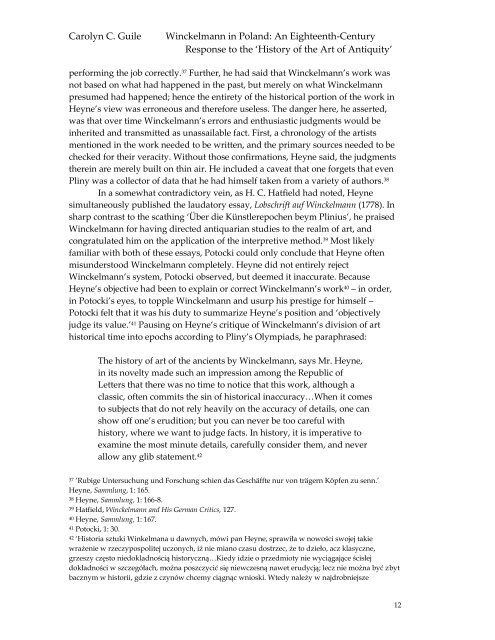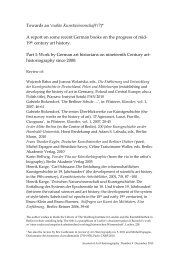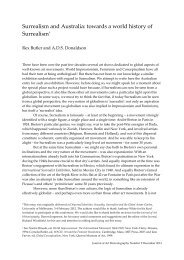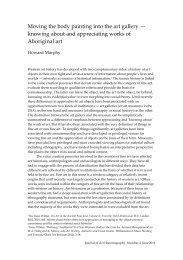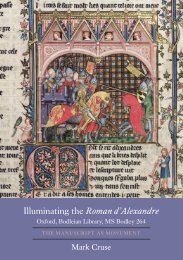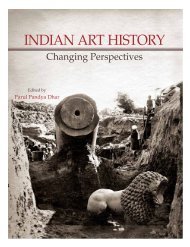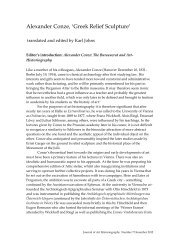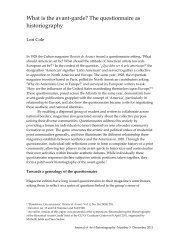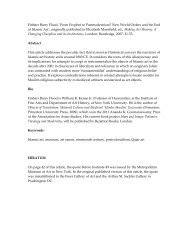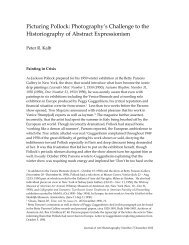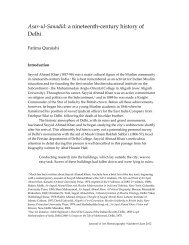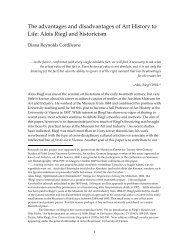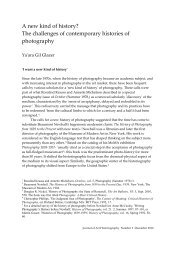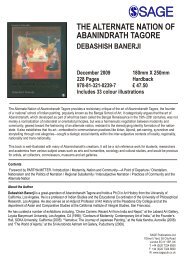9/CCG1 - Journal of Art Historiography
9/CCG1 - Journal of Art Historiography
9/CCG1 - Journal of Art Historiography
You also want an ePaper? Increase the reach of your titles
YUMPU automatically turns print PDFs into web optimized ePapers that Google loves.
Carolyn C. Guile<br />
Winckelmann in Poland: An Eighteenth-Century<br />
Response to the ‘History <strong>of</strong> the <strong>Art</strong> <strong>of</strong> Antiquity’<br />
performing the job correctly. 37 Further, he had said that Winckelmann’s work was<br />
not based on what had happened in the past, but merely on what Winckelmann<br />
presumed had happened; hence the entirety <strong>of</strong> the historical portion <strong>of</strong> the work in<br />
Heyne’s view was erroneous and therefore useless. The danger here, he asserted,<br />
was that over time Winckelmann’s errors and enthusiastic judgments would be<br />
inherited and transmitted as unassailable fact. First, a chronology <strong>of</strong> the artists<br />
mentioned in the work needed to be written, and the primary sources needed to be<br />
checked for their veracity. Without those confirmations, Heyne said, the judgments<br />
therein are merely built on thin air. He included a caveat that one forgets that even<br />
Pliny was a collector <strong>of</strong> data that he had himself taken from a variety <strong>of</strong> authors. 38<br />
In a somewhat contradictory vein, as H. C. Hatfield had noted, Heyne<br />
simultaneously published the laudatory essay, Lobschrift auf Winckelmann (1778). In<br />
sharp contrast to the scathing ‘Über die Künstlerepochen beym Plinius’, he praised<br />
Winckelmann for having directed antiquarian studies to the realm <strong>of</strong> art, and<br />
congratulated him on the application <strong>of</strong> the interpretive method. 39 Most likely<br />
familiar with both <strong>of</strong> these essays, Potocki could only conclude that Heyne <strong>of</strong>ten<br />
misunderstood Winckelmann completely. Heyne did not entirely reject<br />
Winckelmann’s system, Potocki observed, but deemed it inaccurate. Because<br />
Heyne’s objective had been to explain or correct Winckelmann’s work 40 – in order,<br />
in Potocki’s eyes, to topple Winckelmann and usurp his prestige for himself –<br />
Potocki felt that it was his duty to summarize Heyne’s position and ‘objectively<br />
judge its value.’ 41 Pausing on Heyne’s critique <strong>of</strong> Winckelmann’s division <strong>of</strong> art<br />
historical time into epochs according to Pliny’s Olympiads, he paraphrased:<br />
The history <strong>of</strong> art <strong>of</strong> the ancients by Winckelmann, says Mr. Heyne,<br />
in its novelty made such an impression among the Republic <strong>of</strong><br />
Letters that there was no time to notice that this work, although a<br />
classic, <strong>of</strong>ten commits the sin <strong>of</strong> historical inaccuracy…When it comes<br />
to subjects that do not rely heavily on the accuracy <strong>of</strong> details, one can<br />
show <strong>of</strong>f one’s erudition; but you can never be too careful with<br />
history, where we want to judge facts. In history, it is imperative to<br />
examine the most minute details, carefully consider them, and never<br />
allow any glib statement. 42<br />
37 ‘Rubige Untersuchung und Forschung schien das Geschäffte nur von trägern Köpfen zu senn.’<br />
Heyne, Sammlung, 1: 165.<br />
38 Heyne, Sammlung, 1: 166-8.<br />
39 Hatfield, Winckelmann and His German Critics, 127.<br />
40 Heyne, Sammlung, 1: 167.<br />
41 Potocki, 1: 30.<br />
42 ‘Historia sztuki Winkelmana u dawnych, mówi pan Heyne, sprawiła w nowości swojej takie<br />
wrażenie w rzeczypospolitej uczonych, iż nie miano czasu dostrzec, że to dzieło, acz klasyczne,<br />
grzeszy często niedokladnością historyczną…Kiedy idzie o przedmioty nie wyciągające ścisłej<br />
dokładności w szczegółach, można poszczycić się niewczesną nawet erudycją; lecz nie można być zbyt<br />
bacznym w historii, gdzie z czynów chcemy ciągnąc wnioski. Wtedy należy w najdrobniejsze<br />
12


